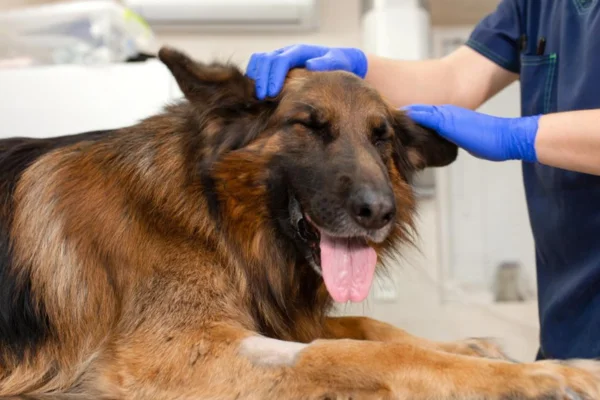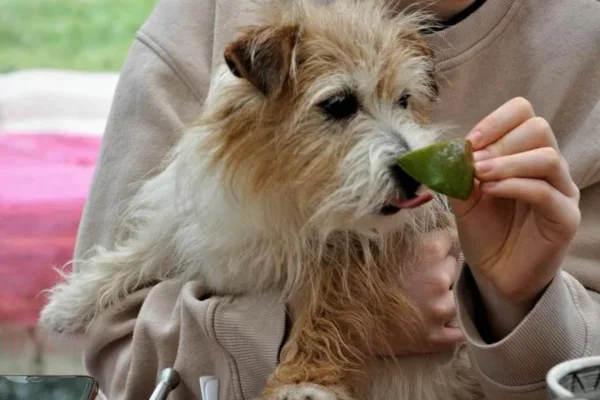Cancer in Dogs
Understanding the Types, Symptoms and Treatments
Looking after a dog is a responsibility full of joys and challenges, and one of the biggest fears many pet owners face is a cancer diagnosis. Although it is a dreaded disease, it is quite common in dogs, especially as they get older.
The good news is that, with advances in veterinary medicine, many types of cancer in dogs can be successfully treated, giving the animal a good quality of life.
This article explores the different types of cancer in dogs, their symptoms and the treatment options available, offering an informative and humane view of this delicate subject.
Contents
What is Cancer in Dogs?
Cancer is the uncontrolled growth of abnormal cells in the body. These cells can form solid tumors or spread to the blood and other tissues. Although the word "cancer" causes great concern, it is important to remember that not all tumors are malignant; some are benign, which means that they do not spread to other parts of the body.
However, when a tumor is malignant, it can invade nearby tissues and spread to other areas of the body, a process known as metastasis. Dogs, like humans, can develop various types of cancer, affecting different organs and systems.
Common Types of Cancer in Dogs
There are several types of cancer that can affect dogs, and knowing the most common ones can help owners identify early signs.
- Canine Lymphoma Lymphoma is a type of cancer that affects lymphocytes, a type of white blood cell that is part of the immune system. It can manifest itself in different parts of the body, but usually affects the lymph nodes, spleen and liver. Dogs with lymphoma may have swollen lymph nodes (without pain), lethargy, weight loss and fever.
- Mastocytoma Mastocytoma is a type of skin cancer that affects immune system cells called mast cells. It can appear as a lump or nodule on the dog's skin, which can be itchy or ulcerated. Although some mastocytomas are benign, others can be aggressive and metastatic.
- Osteosarcoma This is the most common bone cancer in dogs, especially in large and giant breeds. Osteosarcoma usually affects the long bones of the paws, causing severe pain, lameness and swelling. It is highly metastatic and often spreads to the lungs.
- Hemangiosarcoma Hemangiosarcoma is an aggressive type of cancer that affects the blood vessels. It usually develops in the spleen, liver or heart, but can occur in other parts of the body. Unfortunately, it is a silent type of cancer, and is often only diagnosed when the tumor ruptures, causing severe internal bleeding.
- Melanoma Melanoma can occur on the skin, but also in the mouth, claws or eyes of dogs. Malignant melanomas are particularly dangerous because they tend to spread quickly to other organs.
- Breast Carcinoma This type of cancer affects the mammary glands and is more common in females who have not been castrated or who have been castrated after their first heat cycle. Mammary carcinomas can range from benign to highly malignant, and early diagnosis is essential for successful treatment.

Symptoms of Cancer in Dogs
Identifying cancer at an early stage can make a big difference to treatment and prognosis. However, the symptoms of cancer in dogs can be subtle and vary according to the type and location of the tumor. Some of the most common signs to look out for include:
- Lumps or massesAny lump or swelling that persists or grows over time should be evaluated by a veterinarian. Although not all tumors are cancerous, prevention is always better than cure.
- Wounds that won't healIf your dog has a wound that won't heal or seems to get worse over time, it could be a sign of skin cancer or another type of cancer.
- Unexplained weight lossWeight loss for no apparent reason, even if the dog's appetite seems normal, can be a sign of cancer.
- Changes in appetiteSome types of cancer can cause a decrease in appetite, while others can lead to a sudden increase in hunger.
- Lethargy and tirednessIf your dog is less active than usual or seems tired all the time, this could be a sign that something is wrong, including cancer.
- Difficulty breathing, urinating or defecatingDifficulty breathing or changes in urination and defecation may indicate tumors in the lungs, urinary tract or gastrointestinal system.
- ClaudicationDifficulty walking or limping without an apparent lesion can be a sign of osteosarcoma or another type of bone cancer.
- Abnormal bleedingUnusual bleeding, such as from the nose, gums or urine, can be a symptom of cancer in dogs.
Diagnosis of Cancer in Dogs
Cancer in dogs is diagnosed through clinical and laboratory tests. The vet may perform a biopsy, which involves removing a sample of tissue from the tumor for analysis.
Other tests, such as X-rays, ultrasounds, CT scans and blood tests, may also be necessary to determine the extent of the cancer and whether it has spread to other parts of the body.
Available treatments
Like human treatments, the options for cancer in dogs depend on the type of cancer, the stage of the disease and the general health of the animal. Some of the most common options include:
- Surgery Surgery is often the first step in treating solid tumors. In many cases, complete surgical removal of the tumor can cure the cancer, especially if it is benign or diagnosed early.
- Chemotherapy Chemotherapy uses drugs to kill or slow down the growth of cancer cells. Although it can have side effects, such as nausea and fatigue, dogs generally tolerate chemotherapy better than humans. It is often used to treat lymphomas and other types of cancer that have spread.
- Radiotherapy Radiotherapy uses radiation to destroy cancer cells in localized areas. It is often used in combination with surgery or chemotherapy to treat tumors that cannot be completely removed.
- Immunotherapy Immunotherapy is a relatively new treatment that stimulates the dog's immune system to fight cancer. Although it is still under development, immunotherapy has shown promising results, especially for melanomas.
- Palliative Care When cancer cannot be cured or is at an advanced stage, palliative care focuses on comforting the dog, relieving pain and improving its quality of life. This can include the use of painkillers, anti-inflammatories and alternative therapies such as acupuncture.
The Importance of Early Diagnosis
Early diagnosis is fundamental to successful cancer treatment in dogs. The earlier the tumor is identified, the greater the chances of curing or controlling the disease. That's why it's essential for owners to be alert to any abnormal signs and take their pets to the vet regularly, especially if the dog is older.
Prevention: Is it possible?
Although it is not possible to completely prevent cancer in dogs, some measures can reduce the risk. Neutering female dogs before their first heat, for example, significantly reduces the chance of breast cancer. Maintaining a healthy diet, promoting regular exercise and avoiding exposure to toxins such as cigarette smoke are also important for a dog's general health.
In addition, careful observation and regular veterinary follow-up are crucial to detecting early changes that may indicate the presence of cancer.

Cancer in Dogs and the Relationship with the Owner
Receiving the news that your dog has cancer can be devastating. The emotional bond between an owner and their dog runs deep, and dealing with such a serious illness can bring feelings of fear, sadness and uncertainty. However, it's important to remember that many dogs with cancer can live comfortably and happily, even during treatment. Emotional support, daily care and a partnership with a good vet make all the difference to the journey of the dog and its owner.
Conclusion
Cancer in dogs is a serious disease, but with the right knowledge and the right treatment, many dogs can continue to live well and with quality. Being aware of the signs, seeking early diagnosis and offering loving care are key. By tackling your dog's cancer with empathy and information, you ensure that they receive the best possible treatment and enjoy moments of happiness by your side.
Thank you for visiting us and check out our other work
https://vettopbr.com/cachorros/








